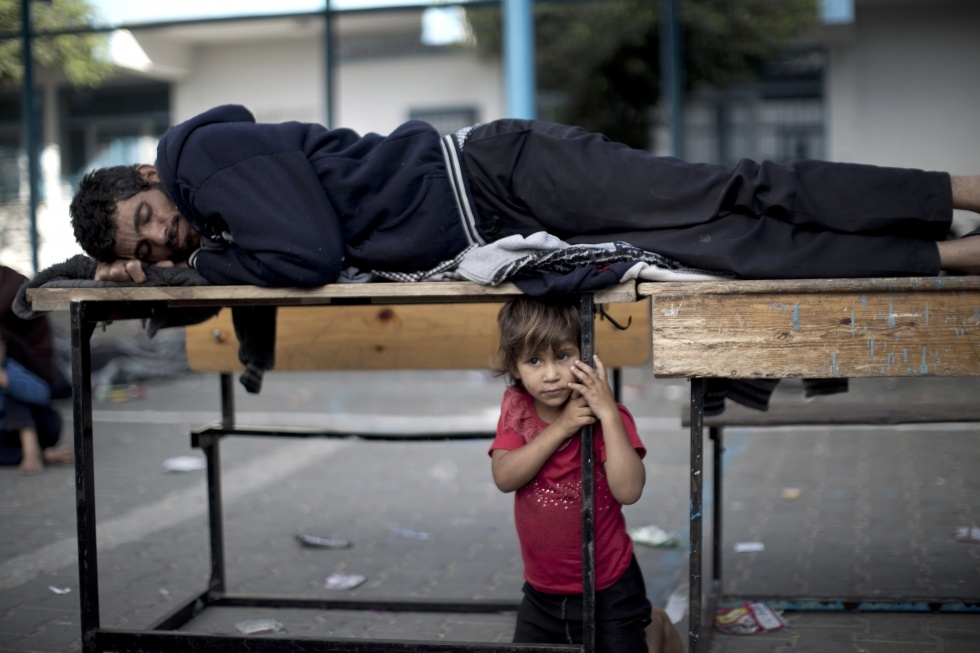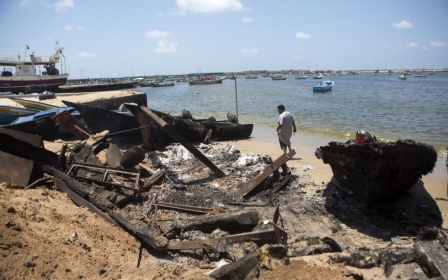Gaza’s school exam joy replaced by fear and loss

Today, Palestinian headlines, news-wires, tweets, and emails should have been dominated by the outpouring of cheer and good will about the successful completion of secondary school graduation exams in Gaza.
Even though these celebrations take place under the very difficult conditions created by the Israeli blockade and policy of collective punishment, great effort is usually poured into making this day special. Families get together and photos are taken, as balloons and confetti line schools and homes alike.
This year, however, the festivities and headlines are nowhere to be seen. When the secondary school results, known as the tawjihi, were announced on Monday the reception was tepid at best.
Instead of the celebratory gun fire into the air in which some people used to welcome the pass results, today they are taking cover to the sound of hovering drones and explosions that follow the firing of Israeli missiles.
There were no fireworks or smiles. Instead, most of Gaza’s 1.8 million inhabitants were busy bracing for further Israeli bombardment – the streets filled with sad faces and the sound of running feat as people busily sought shelter from the military planes and drones above. The cries of joy, drowned out by screams of pain as families said goodbye to their loved one and funeral marches took over the otherwise quiet streets.
“I received my exam results silently, except for the noise of bombing outside,” says Ismail. “But I am happy with my success after the hard work.”
But while a part of him feel proud on the inside, Ismail is refusing to celebrate his results out of solidarity with those killed and injured in the Israeli attacks.
All over Gaza this week, the customary sense of academic pride has been replaced by fear and anxiety as Operation Protective Edge unleashed carnage and destruction. More than 210 Palestinians have been killed and at least 1,500 injured in just eight days since the latest exhibit of Israeli collective punishment got under way.
Twenty students, who would have received their results, have now been confirmed to be among the dead, Gaza’s Education Ministry has said.
This includes four students who were all members of the al-Batsh family. Mohammed, Yahya, Ibrahim and Qusai Batsh were all killed when an Israeli strike hit their home, killing 18 family members in one of the bloodiest strikes so far.
Sixty-three year old Numan Batsh who survived the strike now can’t help but think how his family was supposed to be honoring the success of the family’s young academics, and has instead been left honoring their memories.
“The occupation has destroyed everything; the ground we walk on, the air we breathe, our family joy, our sleep and our children’s’ lives,” says Batsh, who dons a white jalabiya that sharply contrasts with his red blood-stains, blue bruises and black stitches on his left eye where he was hit during the Israeli attack.
“The Israelis turn all joy into tragedy. Human beings have been left with no chance to enjoy their children’s success after years of hard study for a better life.”
While so much of his family has perished, the elderly man is not alone in his pain and suffering, a fact that still manages to bring a smile to his face despite his great loss. Many of his neighbours are mourning his loss alongside him and there is a universal feeling among those who have passed, or have relatives who have passed, that that they will not celebrate out of solidarity.
Ahmed al-Qanou scored 99.3 percent on his exams, but after getting his marks he refused to speak with a local media which usually flocks to high-scoring student’s homes to cover their happy reactions.
But while he has worked extremely hard, Qanou says he doesn’t want to discuss his scores as long as Israel continues to drop missiles on an already-besieged Gaza, and massacre whole families in their homes. The joy he waited for for so long, can wait some more, he explains.
“In every home, family and neighbourhood, there are injured, sick and martyred,” he says. “How can we celebrate amid such pain? For now we must silence the joy in our hearts.”
Palestine’s Education Minister, Khawla Skakshir, told reporters yesterday, that 84,211 students completed their exams, which had a 60.4 pass rate average in the West Bank and Gaza.
Meanwhile, Gaza’s Education Ministry director general Zakaria al-Hur explained that Gaza will postpone announcing results properly, until the end of the crisis.
“In Gaza, we decided not to publish results, under the dreadful circumstances, but Ramallah decided to release the results,” he told the Middle East Eye.
“I have taken calls from journalists, parents and respected figures urging pressure to postpone announcements”, he adds.
Results are there online- for students lucky enough to have electricity or connection- but they are unable to do much with them.
“Some of our Gaza students who were killed, scored top-grades, but they were killed before knowing the result of their hard work”.
These results, however, do appear to have been removed by the Education Ministry and the names and grades of students killed last week have not been published on the website.
So, when tens of thousands of students would usually be running to Gaza’s universities like al-Azhar University, Islamic University and al-Aqsa University to sign up for courses that matched their grades, outside is a ghost town as people hide from the ever-present drones and bombs. This year, there will be no colored ribbons, balloons or sweets to congratulate tawjihi students.
“It’s a Palestinian wedding, which Israel killed,” Hur adds.
Stay informed with MEE's newsletters
Sign up to get the latest alerts, insights and analysis, starting with Turkey Unpacked
Middle East Eye delivers independent and unrivalled coverage and analysis of the Middle East, North Africa and beyond. To learn more about republishing this content and the associated fees, please fill out this form. More about MEE can be found here.




